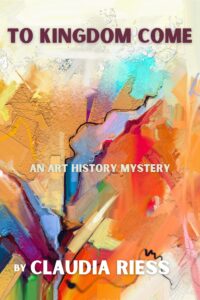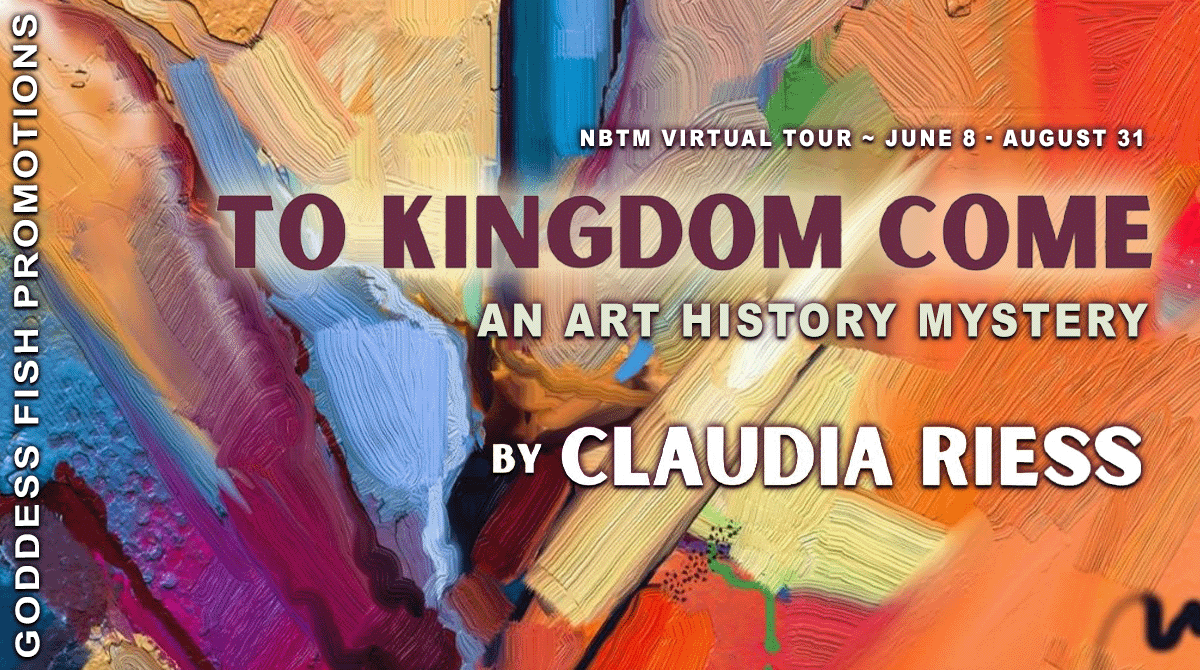Today’s special guest is mystery author Claudia Riess to chat about her new novel To Kingdom Come.

During her virtual book tour, Claudia will be giving away a $25 Amazon or Barnes and Noble (winner’s choice) to a lucky randomly drawn winner. To be entered for a chance to win, use the form below. To increase your chances of winning, feel free to visit her other tour stops and enter there, too!
Bio:
Claudia Riess is an award-winning author of seven novels, four of which form her art history mystery series published by Level Best Books. She has worked in the editorial departments of The New Yorker and Holt, Rinehart and Winston, and has edited several art history monographs. Stolen Light, the first book in her series, was chosen by Vassar’s Latin American history professor for distribution to the college’s people-to-people trips to Cuba. To Kingdom Come, the fourth and most recent, will be added to the syllabus of a survey course on West and Central African Art at a prominent Midwest university. Claudia has written a number of articles for Mystery Readers Journal, Women’s National Book Association, and Mystery Scene magazine. At present, she’s consulting with her protagonists about a questionable plot twist in Chapter 9 of the duo’s murder investigation unfolding in book 5; working title: Dreaming of Monet, scheduled for release winter 2024.
Welcome, Claudia. Please tell us about your new release.
Amateur sleuths, Erika Shawn-Wheatley, art magazine editor, and Harrison Wheatley, art history professor, attend a Zoom meeting of individuals from around the globe whose common goal is to expedite the return of African art looted during the colonial era. Olivia Chatham, a math instructor at London University, has just begun speaking about her recent find, a journal penned by her great-granduncle, Andrew Barrett, active member of the Royal Army Medical Service during England’s 1897 “punitive expedition” launched against the Kingdom of Benin.
Olivia is about to disclose what she hopes the sleuthing duo will bring to light, when the proceedings are disrupted by an unusual movement in one of the squares on the grid. Frozen disbelief erupts into a frenzy of calls for help as the group, including the victim, watch in horror the enactment of a murder videotaped in real time.
It will not be the only murder or act of brutality Erika and Harrison encounter in their two-pronged effort to hunt down the source of violence and unearth a cache of African treasures alluded to in Barrett’s journal.
Much of the action takes place in London, scene of the crimes and quest for redemption
What inspired you to write To Kingdom Come?
In a word: ignorance. I’d just read a news article about attempts to expedite the repatriation of African art and artifacts, and the resistance with which they were met. The article focused mainly on the Benin Bronzes, a few of which I’d seen on exhibit, and although I’d appreciated their beauty, I’d never researched their history and cultural significance. The article prodded my interest and my conscience in equal measure. After reading Dan Hicks’s The Brutish Museums: The Benin Bronzes, Colonial Violence and Cultural Restitution, I was secondarily inspired to jump-start my plot on what the British dubbed their “punitive expedition” of 1897 launched against the Kingdom of Benin.
Excerpt from To Kingdom Come:
He wondered now why had it taken such an effort to decide which of his plans to set in motion. Walking off with an artifact or two from Franks House, the British Museum’s storage facility in East London, may have given him his political statement, but at what cost? The place was crawling with workers in lab coats and masks—conservators, project managers, photographers, interns, auditors, volunteers—the lot of them engaged in the end goal of moving 200,000 objects from the museum’s collection of Africa, Oceania, and the Americans to its nearly spanking new World Conservation and Exhibition Centre. True, it would not have been an insurmountable task, entering the quiet road where the quaint redbrick warehouse lay and unobtrusively blending into the workforce, but then what? Would he have been forced to shoot his way out of the place at the risk of being gunned down himself? How sordid and at the same time mundane to mow down an uncalculated number of individuals, only to find himself a mere casualty sprawled among them. Hell no, he was neither a loony terrorist nor a crack- head martyr. The plan in place was the more sensible course, no question about it.
It was restful, hearing below his thoughts the rhythmic phrase of train wheels clacking against the tracks in lulling repetition. His calmness surprised him a little, given what lay ahead. His scenario had been well choreographed, but only on an imagined stage with players moving about under his ironclad direction. In real life, even the most meticulous plan is apt to be disrupted by unforeseen circumstances. He knew that it was exactly 1.6 miles from Effingham Junction Station to the mansion on Ockham Lane in Cobham, Surrey, but was he certain that he would not be accosted by a madman or struck by lightning on his walk to the place?
If he allowed his thoughts to ramble on in this manner, his nerves would start acting up. He must lean into the physical moment and move with it into his destiny. He looked out the window past his reflection and focused on the indifferent stars.
What exciting project are you working on next?
Book 5 of my art history mystery series. Working title: Dreaming of Monet; scheduled for release winter 2024. It opens on a gala evening auction at Laszlo’s, an upstart auction house in New York City. After a much sought-after Impressionist still life painting is without notice withdrawn from the auction block, its broker is found dead at the foot of an imposing statue in Laszlo’s courtyard. Amateur sleuths Erika Shawn and Harrison Wheatley are once again drawn into an investigation involving an art-related homicide, this time with one sharing an unnerving coincidence with violent crimes occurring abroad. As Harrison is searching for clues in the archives at the Ashmolean Museum in Oxford, Erika is on a stakeout in Brooklyn Heights gathering information on the owner of the hijacked still life. After Harrison experiences a disastrous encounter in London, he returns home, where he and Erika, along with a few of their usual cohorts, find themselves ever more deeply at odds with the movers and shakers on the dark side of fine arts commerce. Right now I’m working on the chapters leading up to the denouement, loosely outlined, but still in flux.

When did you first consider yourself a writer?
I wrote my first book—Reclining Nude—decades ago. After one book, I would use the verb form (less daunting): “I write.” Later, after writing several more, I still felt uneasy claiming the noun. Only after signing two consecutive three-book contracts with Level Best Books for my series did I feel comfortable applying the title.
What would you say is your interesting writing quirk?
Ever since I began writing an art history mystery series, I’ve been compulsive, often annoyingly so, about getting the history part right. I research up a storm before working up the nerve to start writing in earnest. I like to take real people, places, events and, remaining true to their character, relate them in ways that might have been. Then, fast-forward to the present, see what murderous circumstances the butterfly effect has come up with. With To Kingdom Come, the process was particularly time-consuming and obsessive, first, because I was virtually starting from scratch in the fact-absorbing process; second, out of respect for the enduring and rich culture that I was learning about; third, because of the difficult spellings I felt compelled to check and recheck—no way was I going to get them wrong. For example, the name of a well-known Congolese political activist, Emery Mwazulu Diyabanza, was, of course, consistently underlined in red by my computer (as it is now), and required multiple letter-by-letter checks every time I typed it (as I am doing now). The experience proved to be very gratifying, but I have to admit, I did enjoy those intimate interludes, totally un-researched, between Erika and Harrison, my loving protagonists.
Anything additional you want to share with the readers?
Always eager to communicate with you! Drop me an email anytime, at claudiariess.w@gmail.com, or visit my website!
All four books in the art history mystery series are available through Amazon.com, BarnesandNoble.com, IndieBound.org and at independent book stores. For bulk discount purchases, contact https://levelbestbooks.wordpress.com.
a Rafflecopter giveaway
